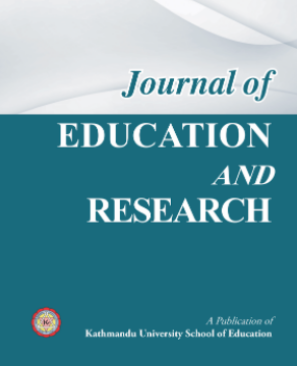
Good Practices in Pursuit of Sustainable Rural Transformation
Original Article
Journal of Education and Research, Volume 4, Issue 2, 2014, 7-23, https://doi.org/10.3126/jer.v4i2.12384
Publication date: Aug 15, 2014
Views: 480 | Downloads: 194
How to cite this article
APA
In-text citation: (Rabinowicz & Chinapah, 2014)
Reference: Rabinowicz, S. G., & Chinapah, V. (2014). Good Practices in Pursuit of Sustainable Rural Transformation. Journal of Education and Research, 4(2), 7-23. https://doi.org/10.3126/jer.v4i2.12384
Reference: Rabinowicz, S. G., & Chinapah, V. (2014). Good Practices in Pursuit of Sustainable Rural Transformation. Journal of Education and Research, 4(2), 7-23. https://doi.org/10.3126/jer.v4i2.12384
Vancouver
In-text citation: (1), (2), (3), etc.
Reference: Rabinowicz SG, Chinapah V. Good Practices in Pursuit of Sustainable Rural Transformation. Journal of Education and Research. 2014;4(2):7-23. https://doi.org/10.3126/jer.v4i2.12384
Reference: Rabinowicz SG, Chinapah V. Good Practices in Pursuit of Sustainable Rural Transformation. Journal of Education and Research. 2014;4(2):7-23. https://doi.org/10.3126/jer.v4i2.12384
AMA
In-text citation: (1), (2), (3), etc.
Reference: Rabinowicz SG, Chinapah V. Good Practices in Pursuit of Sustainable Rural Transformation. Journal of Education and Research. 2014;4(2), 7-23. https://doi.org/10.3126/jer.v4i2.12384
Reference: Rabinowicz SG, Chinapah V. Good Practices in Pursuit of Sustainable Rural Transformation. Journal of Education and Research. 2014;4(2), 7-23. https://doi.org/10.3126/jer.v4i2.12384
Chicago
In-text citation: (Rabinowicz and Chinapah, 2014)
Reference: Rabinowicz, Sarit Grinberg, and Vinayagum Chinapah. "Good Practices in Pursuit of Sustainable Rural Transformation". Journal of Education and Research 2014 4 no. 2 (2014): 7-23. https://doi.org/10.3126/jer.v4i2.12384
Reference: Rabinowicz, Sarit Grinberg, and Vinayagum Chinapah. "Good Practices in Pursuit of Sustainable Rural Transformation". Journal of Education and Research 2014 4 no. 2 (2014): 7-23. https://doi.org/10.3126/jer.v4i2.12384
Harvard
In-text citation: (Rabinowicz and Chinapah, 2014)
Reference: Rabinowicz, S. G., and Chinapah, V. (2014). Good Practices in Pursuit of Sustainable Rural Transformation. Journal of Education and Research, 4(2), pp. 7-23. https://doi.org/10.3126/jer.v4i2.12384
Reference: Rabinowicz, S. G., and Chinapah, V. (2014). Good Practices in Pursuit of Sustainable Rural Transformation. Journal of Education and Research, 4(2), pp. 7-23. https://doi.org/10.3126/jer.v4i2.12384
MLA
In-text citation: (Rabinowicz and Chinapah, 2014)
Reference: Rabinowicz, Sarit Grinberg et al. "Good Practices in Pursuit of Sustainable Rural Transformation". Journal of Education and Research, vol. 4, no. 2, 2014, pp. 7-23. https://doi.org/10.3126/jer.v4i2.12384
Reference: Rabinowicz, Sarit Grinberg et al. "Good Practices in Pursuit of Sustainable Rural Transformation". Journal of Education and Research, vol. 4, no. 2, 2014, pp. 7-23. https://doi.org/10.3126/jer.v4i2.12384
ABSTRACT
Responding to the world's instability in the economy, society, and in the environment, initiatives such as the EFA goals and MDGs acknowledge that the developing world is in crisis. For the rural people, who are the majority of the poor worldwide, economic, social, and environmental instability is a daily reality. Rural people are among the most vulnerable, the most marginalized, and the most oppressed groups and they make up the majority of the poor in most countries. With education as a catalyst for transformation, providing the rural people with the knowledge, skills, and tools they need to improve their lives, and taking into account the context and reality of rural people, sustainability has to be a part of this transformation process. Sustainable rural transformation as a holistic perspective takes into account rural needs, the context, and the process of transformation. This paper identifies the challenges that rural populations are facing, and argues how the concept and practice of education for rural transformation should work towards a sustainable development, envisioning a 'sustainable rural transformation'. This paper illustrates and examines the concept of sustainable rural transformation and why education and good practices are important to promote an equitable sustainable rural transformation and human well-being.
REFERENCES
---
LICENSE
This work is licensed under a Creative Commons Attribution 4.0 International License.
